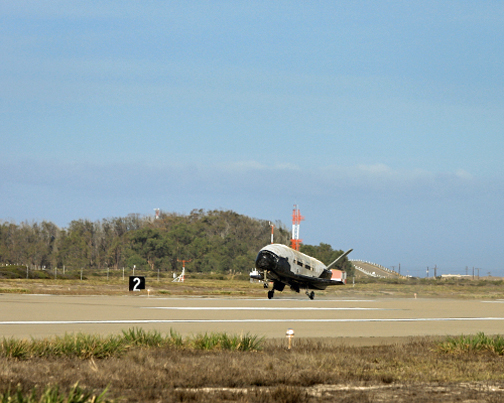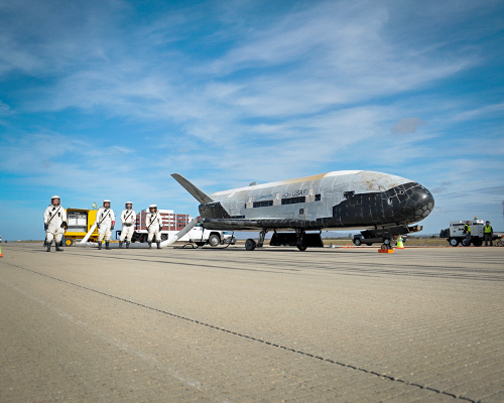
[SatNews] The Boeing [NYSE: BA]-built X-37B Orbital Test Vehicle (OTV) successfully de-orbited and landed at Vandenberg Air Force Base at 9:24 a.m. PDT on October 17, 2014.

A third mission of the Boeing-built X-37B Orbital Test Vehicle was completed on Oct. 17, 2014, when it landed and was recovered at Vandenberg Air Force Base following a successful 674-day space mission.
Photo is courtesy of Boeing.
This landing concluding a 674-day experimental test mission for the U.S. Air Force Rapid Capabilities Office. The X-37B was launched from Cape Canaveral Air Force Station, Florida, on December 11, 2012.
“We congratulate the Air Force Rapid Capabilities Office and the 30th Space Wing at Vandenberg Air Force Base on this third successful OTV mission,” said Ken Torok, Boeing director of Experimental Systems. “With a program total of 1,367 days on orbit over three missions, these agile and powerful small space vehicles have completed more days on orbit than all 135 Space Shuttle missions combined, which total 1,334 days. The innovative X-37B combines the best of an aircraft and a spacecraft into an affordable, responsive unmanned vehicle and continues to demonstrate that reusable space vehicles are affordable options that support vital missions.”

Recovery crew members process the X-37B Orbital Test Vehicle at Vandenberg Air Force Base after completing 674 days in space. A total of three X-37B missions have been completed, totaling 1,367 days
on orbit.
Photo courtesy of Boeing.
The first OTV mission began April 22, 2010, and concluded on December 3, 2010, after 224 days in orbit. The second OTV mission began March 5, 2011, and concluded on June 16, 2012, after 468 days on orbit.
The X-37B program is demonstrating a reliable, reusable unmanned space test platform for the Air Force. Its objectives include space experimentation, risk reduction and concept-of-operations development for reusable space vehicle technologies that could become key enablers for future space missions. Boeing's commitment to this space-based unmanned vehicle spans a decade and includes support to the Air Force Research Lab's X-40 program, NASA's X-37 program and the Defense Advanced Research Projects Agency's X-37 Approach & Landing Test Vehicle program.
The Boeing Defense, Space & Security infosite may be reached at http://www.boeing.com/boeing/bds/index.page?

